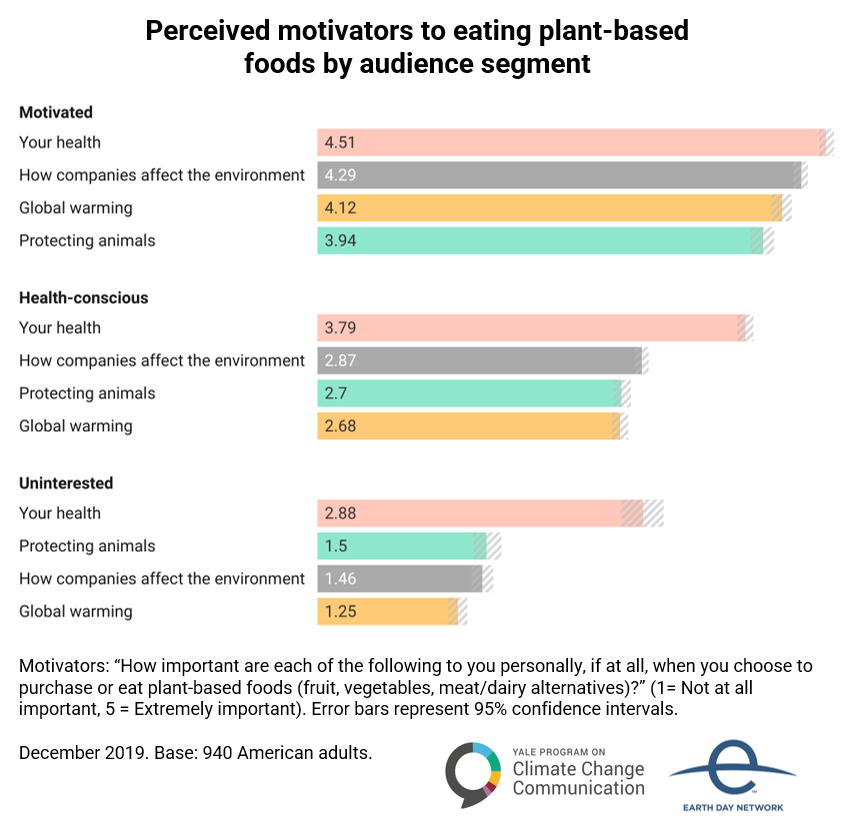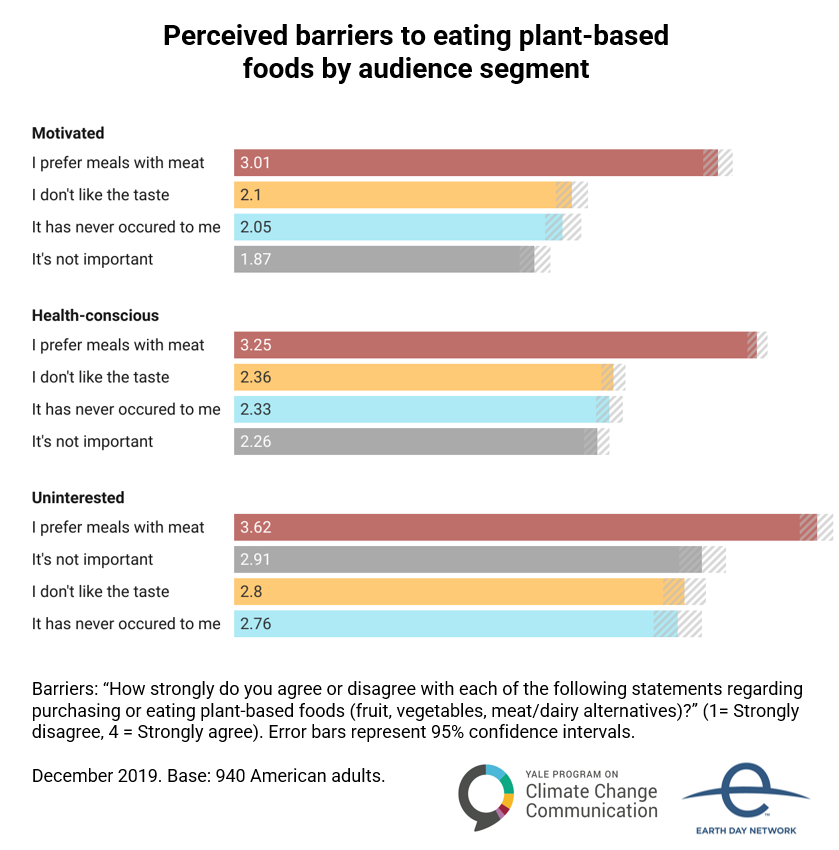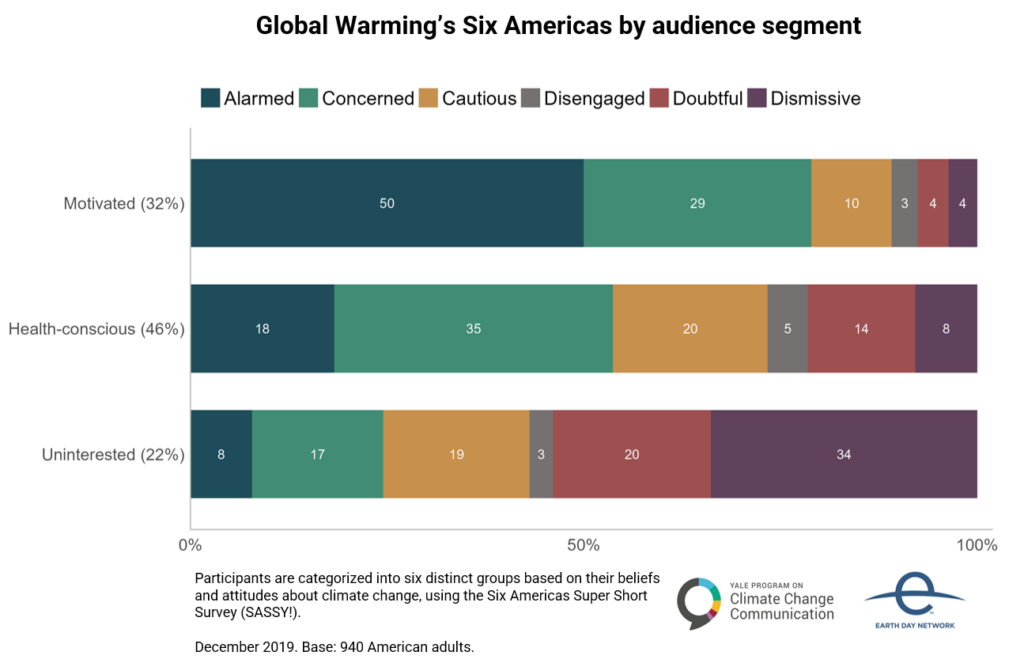Climate Note · Apr 7, 2022
Understanding differences in Americans’ motivations for eating plant-rich foods
By Karine Lacroix, Matthew Goldberg, Jennifer Marlon, Seth Rosenthal, Matthew Ballew, Xinran Wang, Martial Jefferson, Jillian Semaan and Anthony Leiserowitz
Filed under: Audiences, Beliefs & Attitudes and Messaging

We are pleased to share the results of a new study called “PLANTS: A scalable survey tool for identifying groups willing to adopt plant-based diets.” Globally, food is responsible for about a quarter (26%) of carbon emissions. More than half of these food-related emissions are from livestock production. Thus, shifting diets from meat and dairy towards plant-rich foods is a key opportunity to help reduce climate change and improve health. Although only about 4% of Americans identify as vegetarian or vegan, more than half (63%) say they are making efforts to eat less red meat at least ‘sometimes’ (74% of Democrats, 52% of Independents, and 55% of Republicans). Encouraging a shift to more plant-rich diets will require improved communication and marketing; knowing who is more or less willing to adopt plant-rich diets can facilitate this work. This study identifies three different diet-related market segments within the U.S. who have different attitudes about and willingness to adopt more plant-rich diets.
Using data from our Climate Change and the American Diet study, we identified three segments of the U.S. population with different beliefs and attitudes about plant-based foods: the Motivated, the Health-conscious, and the Uninterested. The Motivated are about one third (32%) of the U.S. population, the Health-conscious are about four in ten (42%), and the Uninterested are about one fifth (22%).
The Motivated are the most willing to eat plant-based foods and are strongly motivated by the perceived environmental, health, and animal protection benefits associated with these foods. Half of them are Alarmed about global warming, and this group includes more women (58%) than men. They are less likely to be White, non-Hispanic (62%) than the other two groups and they are more likely to be politically liberal (37%) than conservative (19%).
The Health-conscious (the largest group) include an equal ratio of men to women. About three-quarters are White, non-Hispanic and they are more likely to be politically conservative (31%) than liberal (24%). This group is moderately willing to eat plant-based foods and is primarily motivated by the perceived health benefits. They are more likely to be Concerned about global warming than the other two groups.
The Uninterested group includes more men (62%) than women (38%). A large majority are White, non-Hispanic (88%) and the majority (53%) are politically conservative. This group is the least willing to eat plant-based foods and is only somewhat motivated by the perceived health benefits associated with these foods, although members of this group vary in their perception of the health benefits. The Uninterested are substantially more likely to be Dismissive about global warming than the other two groups.
We offer general recommendations for those seeking to promote a shift to more plant-rich diets. All three groups said they would be more likely to eat plant-based foods if they tasted better, were more easily accessible, and cost less than meat-based meals, although they endorsed these motivators to differing degrees. About half of the Motivated (51%), 24% of the Health-conscious, and 15% of the Uninterested say they would be “very likely” to eat plant-based foods if they tasted better than they currently do. In this context, it is also interesting to note that other research has found that using more appetizing language can also influence consumer choices, such as ‘field grown breakfast’ instead of ‘meat-free breakfast.’
About four in ten of the Motivated (44%), 17% of the Health-conscious, and 6% of the Uninterested say they would be “very likely” to eat plant-based foods if there were more options in stores. Increasing the proportion of plant-based options on menus or offering these foods by default can substantially enhance consumer selections of these foods. In addition, intermingling plant- and meat-based entrées on menus (instead of listing them in a separate section labeled vegetarian) might help normalize them.
About half of the Motivated (53%), 29% of the Health-conscious, and 10% of the Uninterested say they would be “very likely” to eat plant-based foods if these foods cost less than meat options. In general, this is a common misperception among consumers as plant-based meals are often less expensive than meat-based meals. However, lower-income households perceive additional barriers to eating plant-based foods than middle- and higher-income households, including insufficient time (44% vs. 33% of middle- and 25% of higher-income Americans) and cost (71% vs. 59% of middle- and 46% of higher-income Americans).
Tailored messages promoting plant-rich foods are needed to address the unique concerns of different groups. Motivated consumers are worried about global warming, but underestimate the potential climate benefits of plant-based diets. For this consumer segment, communicators could provide more information about the climate and environmental impact of different foods. For Health-conscious consumers a focus on the health benefits of substituting beef with leaner meats (e.g., chicken), can lead to the co-benefit of less carbon pollution. Uninterested consumers who are less willing to change their diet might still benefit from learning about the substantial health benefits and money-saving potential associated with plant-rich meals.
If you would like to find out which segment you belong to, you can take the short survey. We have developed an online survey tool called PLANTS (PLANT-based diet Segmentation) to help researchers and practitioners identify these groups in their population of interest. If you’d like to use the Qualtrics survey tool in your own research, please see the instructions below (requires a Qualtrics account). And if you’re inspired, experiment with a new plant-based recipe today, such as a Butternut Risotto with Leeks, Chinese Eggplant with Spicy Szechuan Sauce, and Grilled Stuffed Chili Rellenos!
How to use the PLANTS Qualtrics survey tool:
- Download and save the Qualtrics Survey File (PLANTS_import.qsf).
- Import the QSF to your Qualtrics account.
- Add any project-specific questions to the survey.
- Test out the survey to make sure the segmentation still works.
- Export your data to verify that the assigned segment is included in your datafile.
- Great job, you should be good to go!


